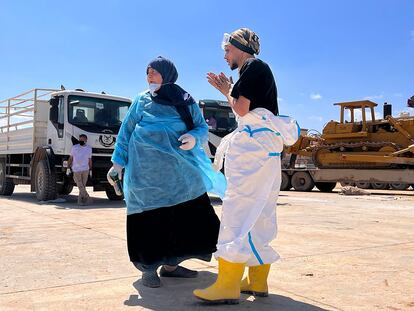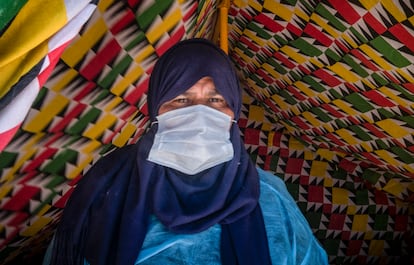Rathia, the only woman who is part of the victim rescue teams in Derna
While only men can carry out burials in the Islamic belief system, she is authorized to access the worst-hit area of the floods and work on transferring bodies to the mass grave in the Libyan town

Volunteers open the ambulance door. They are dressed in PPE and masks, but when several of them prepare to carry the black bag that lies on the stretcher, they realize that just one person is enough. The bag is small: it contains a baby.
Suddenly, everyone present falls silent. The scene, which is repeated four times in an hour, slows down. The transfer of bodies to the truck, where a dozen corpses have been placed, is done carefully, from eight in the morning until nine at night. They are then taken to a mass grave.
Among the 20 volunteers who have been recovering and carrying bodies of the Derna flood victims for the past two weeks, there is only one woman: Rathia Mohamed Azqiba. When dawn broke in Derna earlier in September, after two dams burst due to Storm Daniel, Azqiba saw how her entire neighborhood — “38 buildings,” she details — simply disappeared.
She lost “her uncles and most of her neighbors.” Then, the 65-year-old woman knew where she would go. “In the first few days, I was at the hospital, washing the bodies of victims and preparing them for burial. But, after they stopped preserving them, because they were so decomposed, I came to this location. There used to be a vegetable market here,” she notes, from the tent where other volunteers are lying down, trying to sleep for a few minutes. They collapse briefly when they cannot take it anymore.
Five days after the passage of Storm Daniel — which has caused around 4,000 confirmed deaths — the government of Marshal Khalifa Hafter, which controls the east of the country, decided to quickly bury the bodies that were found, after taking DNA tests. This decision was made to avoid outbreaks of diseases such as cholera. It was then that Rathia Azqiba moved from the morgue to this post, located next to the beach, at the epicenter of the tragedy. She’s the only woman authorized to access this area, which is closed to civilians not registered as volunteers, and to work with the men. Many of the male volunteers have rigid ideas regarding the transfer of bodies to the mass grave, as, according to Islamic beliefs, only men are permitted to carry out burials. Certain members of the local mosques are charged with monitoring compliance with modesty, such as ensuring that the remains of women and girls are not seen or photographed by the foreign press. Several interviewees have discussed the terrible psychological impact felt by the survivors who, when the flood ended, saw the streets crowded with the naked bodies of dead women and girls.
Therefore, the presence of a woman among the volunteers is unusual. It has been made possible due to her involvement in charitable organizations at her mosque during the two civil wars (2011 and 2014-2020) and the fight against the Islamic State. Libya — and, with particular ferocity, Derna — have suffered from this on-and-off violence for over a decade now.
Rathia has a kind look. She used to distribute food and clothing among those affected by the bombings from above and the battles that were fought within the city. “But nothing can compare with what’s happening to us now,” she points out, in a conversation with EL PAÍS on September 19. When she hears an ambulance approaching, she quickly grabs a bottle with disinfectant and another with air freshener. She and the other volunteers carry the bodies. Rathia then sprays them, both to prevent illness and disguise the smell of death. Then, with her gloved hands, she pours out a mixture of bleach and water.
Men — who wear masks and, in some cases, protective glasses — look for ways to show gratitude with their eyes. “This woman has washed more than 1,000 bodies,” Salah proudly exclaims. At age 25, he has lost count of the number of victims he has carried. He tenderly hugs Rathia. Many others express similar reverent gratitude to her, given the care that her work entails.
Rathia Azqiba avoids delving into the reasons why she’s the only female volunteer at ground zero. “Many women died — others are taking care of children and the elderly. That’s why they’re not here. And it’s also true that, in the first days, it was very hard to be washing bodies and to suddenly find your relatives among them.” There’s something that she repeats, like a mantra, throughout the interview: “Despite my pain and the people I have lost, I felt it was my obligation to come here.”

Right behind her, some workers are hurriedly erecting a double metal wall. The objective, they explain, is so that, when civilians are authorized to return to what remains of their homes, they don’t relive the catastrophe. The coast is still littered with twisted cars, rags, remains of toys and shoes — it’s traumatic to look at. The temporary wall is also meant to help people avoid the sight of the water, which is still a greenish-brown due to the tons of waste carried by the flood. Hundreds of people are working throughout the city to try to restore a semblance of normality… a thankless undertaking, given the magnitude of the destruction.
Walking through the streets of Derna plunges one into a state of perplexity. There’s an inability to explain the magnitude of seeing dozens of destroyed neighborhoods, or hundreds of cars piled up, blocking dozens of streets. Entire buildings are half-buried. Even in war zones, it’s difficult to find such a level of devastation.
One of the first symptoms of the return to life are the lines of children and adults — some wearing ragged clothes — who are collecting donated food. Today, they’re receiving boxes of eggs that the owner of a supermarket is giving out, for free, on the first day of reopening. The store shelves look well-stocked, with a wide variety of products. “We do it for our customers, who have been asking us to reopen for days. This isn’t for money, it’s for our neighbors,” explains Mansour, one of the employees. He lost all his cousins and many friends in the floods.
A few streets away, a group of firefighters from Turkey — one of the great allies of the government in Tripoli — is working hard. In theory, they’re in conflict with the administration of the east of the country, under which Derna is located. Helped by an excavator, they sift through the earth until the stench becomes unbearable. “For it to smell like that, it has to be less than [seven feet] away,” says one of the red-uniformed men, who is now digging carefully, looking for the bulge that will give him an idea about where to go. Then, a foot emerges, which quickly becomes a male body. The precise and respectful work of these men — who, before the floods, were considered enemies in this part of the country — is allowed to proceed. They quickly place the man’s body into two bags and use the crane to carefully transport it to the other side of the street.
In this part of the city, many of the buildings have graffiti on their facades: a date, the name of the rescue team and a number. This represents the number of corpses found in each structure. The lowest figure is three.
The United Nations has recently revised the number of victims, now placing it at 3,958 dead, with more than 9,000 missing. It’s the deadliest flood recorded in Africa since 1900, according to data from the World Health Organization. Most of the deceased are being buried in a mass grave on one of the mountains surrounding Derna. There, in the middle of a plain, several machines widen the pit, while around 30 men tirelessly dedicate themselves to holding successive funerals before burying the bodies.
In a different part of the mountain, around the reddish earth — now broken with the white of quicklime — are dozens of plastic tents. This is where those who are dedicated to the burials have been living since the flood. Traditionally, within Islam, only adult men are permitted to be present in a cemetery (though in some communities, all mourners, including women and girls, are allowed at a gravesite).
“See the unity? They killed some of ours, and we killed some of theirs during the war. Now, they’re here helping us. Never have I had more hope that Libya can be under the same government again,” a soldier jokes. His identity cannot be made public, as he’s not authorized to make statements.
Rathia Atqiba shares this sentiment. “As soon as this misfortune happened to us, Libyans from the east and the west came to help us. It’s a demonstration of the unity that our country is experiencing.” Suddenly, there’s commotion around her: one of the other volunteers has seen a dark spot in the rough sea. Little by little, a crowd spreads out on the rocks. They spend half-an-hour trying to see if it’s a body, until they confirm that it’s some type of plastic or piece of clothing.
“When the work here is over, I will continue looking for people to help, [like] all those refugees who have been left homeless,” Rathia sighs. According to the UN, more than 40,000 Libyans now live in schools and other public buildings in Derna and the surrounding towns.
They have been left with nothing. Rathia makes it very clear that, when Derna stops being in the news, these people will need more help than ever.
Sign up for our weekly newsletter to get more English-language news coverage from EL PAÍS USA Edition
Tu suscripción se está usando en otro dispositivo
¿Quieres añadir otro usuario a tu suscripción?
Si continúas leyendo en este dispositivo, no se podrá leer en el otro.
FlechaTu suscripción se está usando en otro dispositivo y solo puedes acceder a EL PAÍS desde un dispositivo a la vez.
Si quieres compartir tu cuenta, cambia tu suscripción a la modalidad Premium, así podrás añadir otro usuario. Cada uno accederá con su propia cuenta de email, lo que os permitirá personalizar vuestra experiencia en EL PAÍS.
¿Tienes una suscripción de empresa? Accede aquí para contratar más cuentas.
En el caso de no saber quién está usando tu cuenta, te recomendamos cambiar tu contraseña aquí.
Si decides continuar compartiendo tu cuenta, este mensaje se mostrará en tu dispositivo y en el de la otra persona que está usando tu cuenta de forma indefinida, afectando a tu experiencia de lectura. Puedes consultar aquí los términos y condiciones de la suscripción digital.








































